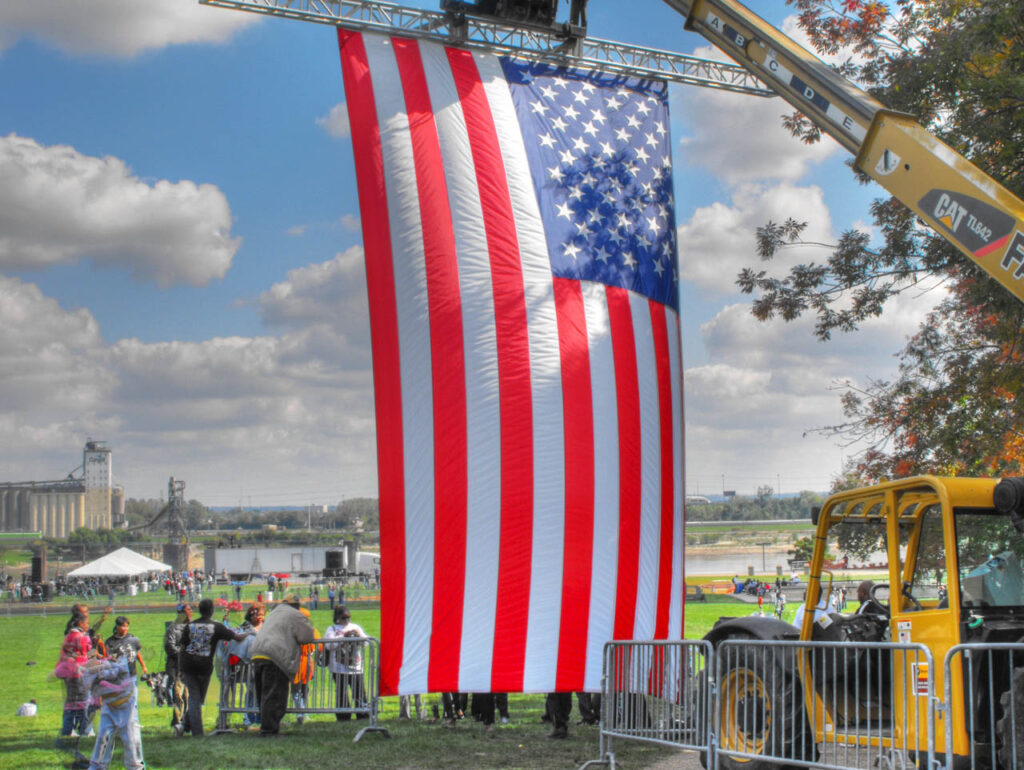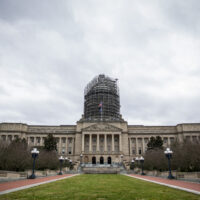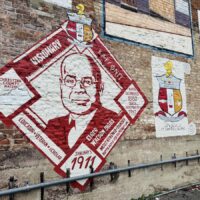In the era of Trump, there have been countless attempts to explain the conservative voting habits of small town America. Many rely upon taken-for-granted notions of rural backwardness, overrepresenting the views of the most extreme.

In the Daily Yonder’s recent podcast series, “Backroad Ballots: Rural Politics in 2024”, we sought to deconstruct oversimplified narratives about voters in America’s countryside. We asked rural scholars and organizers who the rural voter is, and what she cares about.
We compiled our conversations into four episodes to arm listeners with a nuanced framework for understanding the lead-up to the 2024 election in rural America. Beyond asking about what’s at stake, though, we also asked each guest to envision the country’s democracy in an ideal future:
“What’s one thing you would see in an America where rural people are more engaged and better represented?”
We’ve compiled their answers below, edited for clarity and length. You can listen to the full conversations and more on “Backroad Ballots.” Find it in the Rural Remix podcast feed, available on Apple Podcasts, Spotify, or wherever you get your podcasts.
Anthony Flaccavento, co-founder of Rural Urban Bridge Initiative
If five or ten years from now we were in a better place, part of it would be that rural people and the things we do – our occupations – feel and really are respected beyond our communities.
And, that city people and suburban people not only have more respect for rural people, rural values, rural occupations, farming, whatever, but also recognize much more than they do now the interdependence, that cities and suburbs absolutely need healthy, functioning rural places. Those of us who live in towns, cities and suburbs depend on rural people for most of our life. Our food, our fiber, our energy, our materials, etc., etc., etc. So, the one thing would be this greater acknowledgement of that: the interdependence. And with that, a respect for rural people and rural values.
Annie Contractor, policy director at Rural Organizing and the RuralOrganizing.org Education Fund
I think I wanna reject the premise that rural folks are not engaged. I think people everywhere are really engaged. When folks find that the work they do kind of goes into a black hole, they put their energy into something else, where it’s gonna have more impact. People in lots of rural communities are doing work, to create visions, to engage in planning processes, to create a sense of community around them.
I think the challenge is for our government structures to do a better job of recognizing the work that folks in rural communities are already doing to identify their priorities and their values, and to really wrap those into the programs that we design that are meant for rural communities, so that they can be completely integrated into this fabric of a rural-suburban-urban continuum of a municipal, county, state and federal government. That fabric, and the people involved in it, have a responsibility to recognize the engagement that’s already there, the priorities that are already identified, and the work people are already doing to build that sense of belonging around them. And to take down the blinders of, ‘we do that by being in the Democratic Party,’ or ‘we do that by being in the Republican party,’ but to say, folks create meaning and belonging for themselves all the time.
Let’s find where folks already feel like their voice is heard and impactful, and bring that into these systems meant to deliver results through tax-funded policy.
Chelsea Kaufman, associate professor of political science at Wingate University
I think many of us are aware that there are huge percentages of people that don’t participate in elections, and especially outside of presidential election years. I would love to see more research into the voter turnout gaps and the campaign participation gaps. If people care about their local community so much, making sure that they’re participating in state and local politics as well, that they’re voting in those elections, they’re informed on those elections.
And this can be such a problem because… sometimes, there’s very little media coverage of their specific local area. So focusing on those things in addition to the question of, ‘why are rural Americans voting so often for the Republicans on the national level’.
How can we get them participating in every election so that not just a subset of people – but everybody there – is being represented.
Nicholas Jacobs, assistant professor of government at Colby College and co-author of “The Rural Voter: The Politics of Place and the Disuniting of America”
In addition to this concern about local information being accessible, I’d also like politics to reflect more of the local concerns and the needs of different rural communities. Voters have very real, personal, community-oriented concerns and needs. And we need a politics that’s reflective of that. It’s a very low bar, but it’s a bar we’re going to have to clear before we get to the more beautiful world of rural participatory, emancipatory politics. I just want rural voters to have a choice in their politics.
And I say that – and I’m very clear – not because I think Democrats have the solution to rural problems or that progressives know how to fix the rural economy. I think oftentimes Democrats need to hush up a little bit more and check their grandiose ambitions and really try to understand the complexity of those problems and stop offering solutions that ain’t solutions.
As it relates to politics, it is a Democratic Party problem right now. It’s not a progressive problem. It’s a Democratic Party problem right now. Not showing up in hundreds of rural communities and not running candidates for office and not running quality candidates that stand a chance. Candidates that are from the rural community that can speak to specific localized, rural issues; candidates that don’t just treat rural communities as a stereotype and come into campaign and say, ‘Well, if I talk about guns, I’ll trick them yokels into thinking I’m one of them,’ but actually understanding the complexities of rural voters.
Right now, I think there are some forces within mainstream Democratic Party politics that are realizing that. The game that we’ve been playing since 2008 or 2010 is not a game we can win in the long run. I hold out a little bit of hope that that’s going to translate into changes in how rural candidates are supported. My hope is that it has an effect on how current representatives of rural America no longer feel compelled to take certain constituencies for granted. I hope, like Chelsea [Kaufman] does, that it brings out the disaffected. That’s where my thinking is at right now.
Keith Orejel, associate professor of history at Wilmington College
I think you need a reinvigoration of broad-based economic growth that has some mechanism of organizing the rural working class. We need to hit upon something that is the old urban industrial model: how is it if we get the rural economy growing, the people that come to work in these places can be mobilized in such a way as to become engaged in politics. In a similar way that you had with the New Deal industrial schema where this whole level of political engagement with the Democratic party and things like that would be the path forward.
The more the economic condition continues to deteriorate, the stronger the grip local elites are going to have. That tends to historically be the case.
The only way you’re ever going to have the politics of rural areas moderating and returning to something more like a competitive landscape is if there is economic growth. It brings in new groups, it empowers those new groups to then challenge the dominance of local elites. That would be the path I would see forward. The question is just if there’s any political will or stomach to undertake such a gigantic initiative, similar to what [the federal government] did in the sixties with all of the investment pumped in rural areas. Whether or not there is any political capital for such a gigantic reconstruction project is where I think this becomes less hopeful.
Nick Bowlin, freelance journalist and contributing editor with High Country News
A lot of the reporting I do focuses on natural resource industries broadly, whether it’s mining or oil and gas or land conservation, where the land itself is a desirable commodity. I’d be so interested to hear about a rural area that didn’t transition to something else, like an amenities- or service-based economy – recreation tourism – but also didn’t fall into the natural resource curse. You know, the poorest people are on the richest resources kind of a thing.
And I don’t know if that example exists, but I’ve got to think that the relationship between rural America and the rest of the country is going to be something along the lines of, resources need to come out of these areas. But, how is that done without destroying the land and no benefit returning to the people who live there. I have no idea what that is, but it’s just that. Figuring out a way to rework that relationship feels pretty fundamental.
This article is part of U.S. Democracy Day, a nationwide collaborative on Sept. 15, the International Day of Democracy, in which news organizations cover how democracy works and the threats it faces. To learn more, visit usdemocracyday.org.
This article first appeared on The Daily Yonder and is republished here under a Creative Commons license.





